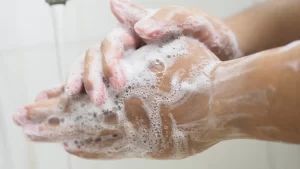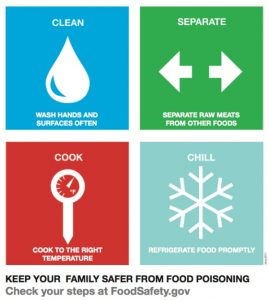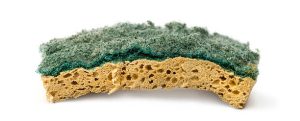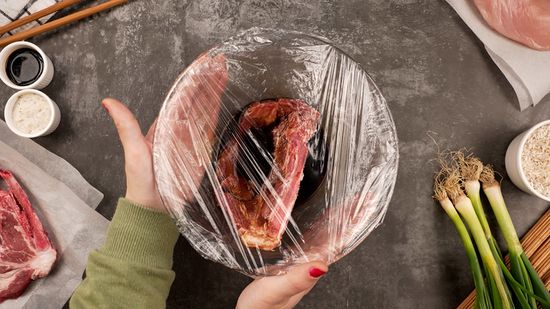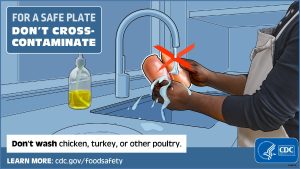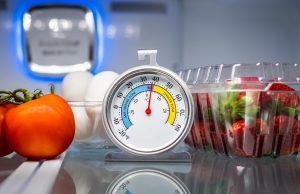Somewhere along the way growing up, we learn about the importance of cleanliness. Things like “Don’t grab a hot pot.” Or, ”don’t thaw meat open on the kitchen counter.” Or, “Don’t eat raw cookie dough unless you know it was made with pasteurized eggs.” Usually we think mostly about the food spoiling, which is important. But food safety has become an ever growing issue.
The Centers for Disease Control and Prevention estimates that 48 million people get sick from something they ate each year; 128,000 are hospitalized and 3,000 die. Sometimes the cause isn’t clear.
The Most Common Food Safety Mistakes
Believe it or not, just washing your hands before AND during their food prep time can make a huge difference. The U.S. Department of Agriculture conducted an experiment in which almost 400 people had to prepare a meal in a test kitchen. The researchers found that 97-percent didn’t wash their hands when they should have. They also found that when they did wash their hands, they weren’t doing it properly.
According to the USDA, people should wash their hands before you begin and anytime after you have handled raw meat. Every time, cooks should wet their hand, use soap and rub vigorously for at least 20 seconds. The biggest mistake most people make is not that vigorous rubbing part.
You Know Where That Hand Has Been
In that USDA study, the second most common food safety mistake is being careless with your seasonings. No, we’re not talking about too much seasoning. We’re talking about Cross Contamination. Think about it. Lots of cooks, like me, use a salt cellar on their countertop rather than a conventional salt shaker. A salt cellar for those who don’t know, is simply a small dish with a lid, often air-tight, and sometimes a small spoon. Cooks who do a lot of eye-ball cooking, (“You know, just a pinch!”), we are more likely to stick our fingers in the salt, Kosher of course because it’s easier to work with, grab a pinch and salt my food. But, if you combine that with not washing your hands enough or well, and you are going to make yourself or, worse, someone else sick.
Let’s say you’re arranging chicken pieces on a sheet pan. You grab the salt and season the chicken. At most you might wipe your fingers on your kitchen towel before grabbing the pepper mill. ACK! If there was salmonella on that chicken, you picked it up on your fingers. Then you touched the salt, possibly contaminating it. Depending on the type of organism, it could stick around and spread that contamination to other foods. If those foods are hot, this is probably not a problem. But raw food could easily be turned into a germ bomb.
In that USDA experiment, the researchers doused ground turkey with a harmless virus to stand in for a dangerous pathogen. That enabled them to track the spread of the virus during the experiment. They found the most transferred virus on the salt, pepper and spice containers used during preparation and cooking. The report published in the Journal of Food Protection found that nearly half the people spread the virus to those containers and their contents. For comparison, only about 10% contaminated faucet handles and about 20% contaminated the soap dispensers. Food safety experts say harmful pathogens can live on a hard surface, like a door handle, for hours.
Wash After Seasoning
From there, a harmful bacteria can spread to cutting boards, garbage can lids, and containers. A better way to go would be to look back at the first rule; Wash Your Hands!
I like to use a lot of seasonings. Perhaps you have read here before about my Bachelor’s Kitchen All-Purpose Seasoning Mix. But I like to use all different kinds of spices and dried herbs. You should try making a spice mix of your own. That way, you are less likely to contaminate the other spice containers.
Another trick many cooks and chefs use is to pour dry spices into the palm of their hand and then pinching from there, dumping the excess in the sink. That way the whole container isn’t contaminated.
Beware Of The Blob, er, Sponge
You might have already heard this, but the biggest place for bacteria and other microorganisms to grow and spread is in the common kitchen sponge. They are a hotbed of microbial growth and are hard to clean.
But if you really want to use a sponge around the kitchen, run it through the dishwasher every day to sanitize it. Or you can microwave a wet sponge for just a minute, which will kill off any unwanted pests. Just be very careful because the sponge will be very hot. Also, be sure there is no metal in it. Also, try to not use the same sponge you use to wash dishes to also clean up your prep area. Even then, you should replace your sponge every week or two.
Another good option is to invest in kitchen wash cloths. You can use those for a day and then throw them into the laundry. Either way, be sure to rinse and squeeze out the sponge or rag so it dries quicker, leaving less time in the favorable element for critters to grow. Always throw the sponge or cloth away immediate if it begins to smell, a sure sign of bacterial growth.
I Got Those Shopping Bag Blues
What’s a good little shopper to do? First we are told to give up plastic bags. Okay, we said and began stashing shopping bags in our car trunks. Then the Pandemic came, and we had to give up using our own bags for the plastic ones from the store. The Pandemic is past now, but is it safe to bring our own bags to the store again?
The answer is “Yes,” and “No.” First of all, be sure your shopping bags are cloth. While it is true that cloth bags will trap any bacteria from leaking meat packages, they are washable. In other words, don’t use the same bag over and over again without washing it in between uses. Or, you can designate one bag only for meat, poultry and seafood, just to keep things separate. But washing them is still a good idea. Be sure to use lots of hot water. When in doubt, at least be sure to put meat and seafood into plastic bags, preferably ones you can seal.
Cool Your Meat
In addition to cross contamination, there is also the chance that some little beastie has found a home on the surface of your meat, seafood or poultry. If you combine the chance of cross contamination and hospitible temperatures and conditions, you get a food-born illness that can be fatal.
A case in point occurred a few years ago in a company cafeteria in which 60 people were sickened by e. coli, a deadly bacteria most associated with large animal feces. As the investigation progressed, they found that all those sick people had eaten chicken tenders. But chicken usually doesn’t harbor e.coli. Officials learned that in the company’s cafeteria, the fully cooked chicken tenders had been stored beneath raw ground beef. The tenders were then served without further cooking. The bacteria had moved, probably in water droplets, from the beef to the cooked chicken. While the beef was later cooked, killing the bacteria, the chicken tenders were not.
It’s always best to store meat and seafood, if not frozen, on the bottom shelf of the refrigerator. The air is cooler there, preventing the growth of most bacterias. Be sure they are securely stored in containers or sealed plastic bags to prevent the juices from contaminating other foods. Clean up any spills in the fridge immediately, and at least once a month thoroughly clean shelves and all other surfaces inside.
Skip The Rinse With Poultry
You’ve probably heard controversy over whether or not you should rinse a chicken under running water in the sink or not. It may seem counterintuitive, but it really is true that you are more likely to spread germs than wash them off your chicken. Remember that the bird will undergo high heat which will kill any of those microbes. Just pat the skin of your chicken dry with a few paper towels.
No Cooking While Swiping
A survey conducted by the FDA and the USDA found that many people use a mobile device while cooking. Now that by itself is no big deal. But, do they wash their hands after each time touching the screen? The survey showed that only about a third of people washed their hands. It’s okay to have that handy device in the kitchen, but remember to always keep things clean, especially your hands. Research shows that those devices are teeming with bacteria, which you could then transfer to your food. So, if you can’t keep your hand off your device, just be sure to wash your hands before handling food.
What’s The Temp, Doc’?
During the brief time I worked as a produce clerk in a supermarket, one of my jobs was to take temperature readings every few hours to make sure the cold storage room and the refrigerated cases on the floor were not only working, but at the correct temperature, or at least pretty close. They used a laser thermometer for this job, just point and take a reading. It’s probably not practical for you to buy a similar device for your home. But you can put any old thermometer in the ‘fridge to take the temperature. If it’s not cold enough, bacteria can grow and spread.
You can buy a thermometer made to go in the refrigerator, or not. Experts say the temperature should be below 40℉, around 37℉ is ideal. In the freezer you want the temperature to be around 0℉ to keep food safe.
Sorry, No Pet Chefs
I know your fur baby is part of the family but if at all possible, you should keep the pets out of the kitchen. They can spread germs all over counters and tables. Cats can be a special problem. But remember where they walk, and that it includes the litter box.
But if you can’t join ‘em, you can teach them that some of those places are “no go” territory. The Humane Society recommends getting some cheap plastic placemats and put double sided tape on them. Place them on the counters and tables when not in use. Cats don’t like the sticky surface and will soon avoid the area. For dogs, you might consider a gate or obstacle of some kind that will keep them out. I know it seems cruel, but it’s for the pet’s safety as much as yours.
Another tip is to keep food put away and not laying out on the counter tops or tables. If you’re setting up a buffet, you’ll want to either keep the four legged guest out of the room or have someone standing guard. If your pet knows they can sneak a free treat when no one is looking, they will.
Cooking is no fun if someone gets sick because of it. Following the food safety rules can make sure you and your guests stay healthy.

